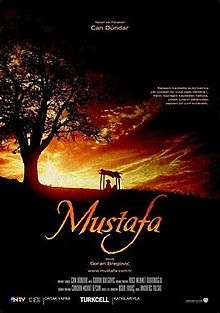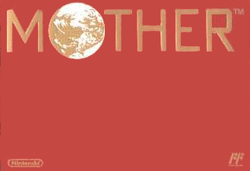Mustafa
Mustafa is the primary transliteration of the Arabic given name, Arabic: مصطفى, Muṣṭafā. The name is an epithet of Muhammad that means, The Chosen One. It is a very common male given name throughout the Muslim world. This name is mostly used in Turkey after Mustafa Kemal Atatürk, founder of the Republic of Turkey.
Given name
Moustafa
Moustapha
Mustafa

Mustafa (film)
Mustafa is a 2008 Turkish biographical documentary about Mustafa Kemal Atatürk, the founder and first president of the Republic of Turkey, which was written and directed by Can Dündar. The film, which controversially concentrates on Atatürk's personal life, is the first documentary covering Atatürk's life from his early years to his death. It was released on Republic Day, 2008, to coincide with the 85th anniversary of the foundation of the Turkish Republic.
Production
A detailed literature review was made of books written about Atatürk, national and international newspapers and diplomatic letters in preparation for the production. Dündar and his team were given special access to many national and international archives, including those at the President's Office and the General Staff, uncovering several previously unseen photos, memoirs, special letters and manuscripts of Atatürk which were used in the production.
The film was shot over nine months on locations including Thessalonica, Manastır, Berlin, Damascus, Sofia, Carlsbad and Istanbul, the places where Atatürk lived, and some scenes were shot in the room where he was born and the one where he died. His personal belongings, memoirs, headquarters where he worked, houses where he lived, documents that he left, songs he liked and remarks he uttered were all used in the documentary.
List of Austin Powers characters
The following is a list of fictional characters from the Austin Powers series of films.
Main characters
Austin Powers
Austin Powers is a British secret agent, an "international man of mystery." He works as a fashion photographer by day and a British Intelligence agent by night, and always becomes extremely excited when an attractive woman is working with him or is simply nearby. He is the main protagonist of the series.
In all three films, Austin learns of a new plot by Dr. Evil and intervenes to prevent it. His quests to prevent Dr. Evil from carrying out his schemes often involve his meeting various types of people, getting into fights, and getting caught up in wacky situations. He has a new young and sexy female ally in every film (not counting Marie Kensington).
Dr. Evil
-ana
-ana (more frequently -iana) is a suffix of Latin origin, used in English to convert nouns, usually proper names, into mass nouns, as in Shakespeareana or Dickensiana, items or stories related to William Shakespeare or Charles Dickens, respectively.
The recognition of this usage as a self-conscious literary construction, typically as a book title, traces back at least to 1740, when it was mentioned in an edition of Scaligerana, a collection of table talk of Joseph Justus Scaliger, from around 150 years previously. By that period Scaliger was described as "the father, so to speak, of all those books published under the title of -ana".
As grammatical construction it is the neuter plural, nominative form of an adjective: so from Scaliger is formed first the adjective Scaligeranus (Scaligeran) which is then put into the form of an abstract noun Scaligerana (Scaligeran things). In Americana, a variant construction, the adjectival form already exists as Americanus, so it is simply a neuter plural (suffix –a on the stem American-); the case of Victoriana, things associated with the Victorian period, is superficially similar, but the Latin adjective form is Dog Latin.
Ana
Ana or ANA may refer to:
Places
Entertainment
Organisations and companies

Mother (video game)
Mother (Japanese: マザー, MOTHER), released outside Japan as EarthBound Beginnings, is a 1989 Japanese role-playing video game developed by Ape and published by Nintendo for the Famicom (Nintendo Entertainment System). The game is modeled on the gameplay of the Dragon Quest series, but is set in the late 20th century United States, unlike its fantasy genre contemporaries. Mother follows the young Ninten as he uses his great-grandfather's studies on psychic powers to fight hostile, formerly inanimate objects and other enemies. The game uses random encounters to enter a menu-based, first-person perspective battle system. It is the first game in the Mother series and was followed by two sequels, EarthBound in 1994 and Mother 3 in 2006.
The game's writer and director, Shigesato Itoi, pitched the game concept to Shigeru Miyamoto while visiting Nintendo's headquarters for other business. Though Miyamoto denied the proposal at first, he eventually gave Itoi a development team. The game was released in Japan on July 27, 1989. A North American version was localized into English, but was abandoned as commercially nonviable. A copy of this prototype was later found and circulated on the Internet under the unofficial, fan-created title EarthBound Zero. The game was eventually localized and released worldwide under the name EarthBound Beginnings for the Wii U Virtual Console on June 14, 2015.
Podcasts:

